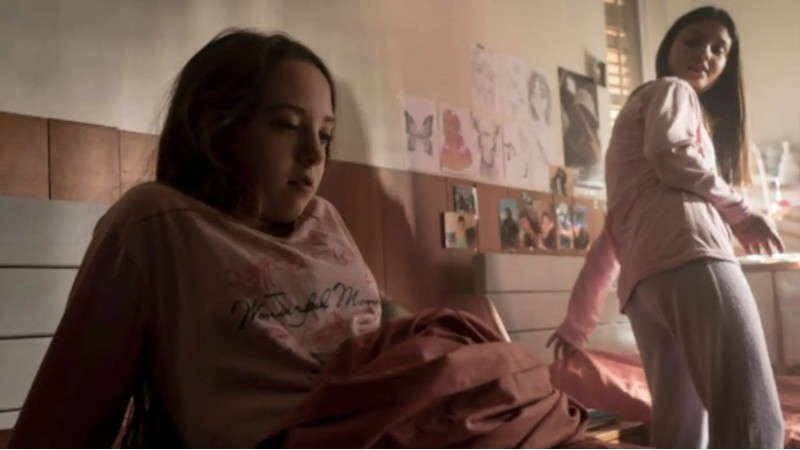‘He’s trying to fuck with me!’ howls 14-year-old Carla (astonishing first-timer Carla Quilez) as she tries in vain to get her newborn baby to stop crying; any remaining rose-tinted scales she may have about motherhood falling from her eyes. Barely into adolescence herself, the strange limbo of young parenthood personified by this combustible teen is the subject of Pilar Palomero‘s big-hearted but unsentimental second feature.
Carla isn’t just a normal tearaway. Her idea of fun, along with her best friend and partner-in-literal-crime Efrain (Jordan Angel Dumes), is to break into the homes of well-to-do neighbours, drink their booze, and smash up the place. It doesn’t go down well with her mother Penelope (Ángela Cervantes), a not-entirely attentive parent herself, and it lands even worse with her social worker. The final straw is the reveal of Carla’s pregnancy (presumably an accidental consequence of some naive fooling about with Efrain), which gets her sent to a group home which supports young mothers during the last months of their pregnancy and the first few years of their children’s lives. There she becomes part of a wider, surrogate family.
Palomero’s empathetic film is an unalloyed piece of social realism that sits proudly alongside the best operating in that field, like Andrea Arnold and Water Lillies/ Girlhood-era Céline Sciamma. There’s also a strong resemblance in style and setting to Samantha Morton‘s underseen, semi-autobiographical TV-movie The Unloved. It’s here that the film quickly goes about transforming Carla’s perception of the home from a punishment to something of a safe haven, even if it won’t stop the mercurial girl from hauling at the imaginary bars on the windows, railing against the perceived injustice of the very sensible rules implemented by the deeply caring staff. Because while one braces for some tough viewing when anything approaching an institution looms into view – such as Peter Mullan‘s The Magdalene Sisters – it’s a feeling that is quickly dispelled. Carla’s introduced to the other residents at a house meeting where the girls tell their stories, and each is based on the real-life experiences of the non-professional actors playing fictionalised versions of themselves. It’s a masterpiece intuitive casting, setting the hopeful tone of the picture, with the resilience and compassion of the young women providing something of a template for Carla to follow.
Not that it is an easy ride for Carla. Palomero’s script doesn’t deal with platitudes, nor shy away from the harsh realities of motherhood. Quilez’s quicksilver performance is mother bear fierce, deeply vulnerable, and quite frankly remarkable. The film’s elliptical style – cutting abruptly from confirmation of pregnancy, to beginning of third trimester, to the immediate post-natal period – allows the switches in her character to be obvious. We can see where she’s grown more easily, and it also makes her occasional recidivism into petulance and self-destruction more glaring.
The focus on the ersatz family setup is satisfying, but it leaves Carla’s relationship with Penelope a little opaque, and we get little insight into her as a character, although everything we see if filtered through Carla’s perspective. And once her baby is born, the film settles into the same sense of routine rhythm as a young mother. The result is a slight dramatic lull, until the occasional teenage meltdown. But La Maternal isn’t setting out to be a searing social polemic or a tragic melodrama. It’s simply highlighting one particular type of maternal experience, and it does it without pessimism or a sense that it’s jabbing at some societal alarm (teenage pregnancy hysteria having gone the way of the AIDS crisis as ‘gay plague’ and the Satanic Panic in terms of conservative hot button topics). Its adherence to its grounded aesthetic may not make it the most intense viewing experience, but it’s a richly rewarding drama where all the rollercoaster thrills are contained within its mercurial heroine.
Screened as part of Glasgow International Film Festival


Comments